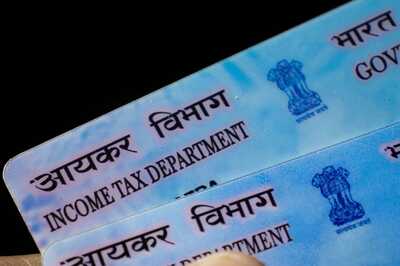
views
The government has decided to issue Sovereign Gold Bonds (SGBs) in two tranches during the financial year 2023-24. The first tranche will be open for subscription during June 19-June 23, while the second tranche will be opened during September 11-September 15.
“The SGBs will be sold through Scheduled Commercial banks (except Small Finance Banks, Payment Banks and Regional Rural Banks), Stock Holding Corporation of India Limited (SHCIL), Clearing Corporation of India Limited (CCIL), designated post offices, and recognised stock exchanges, viz., National Stock Exchange of India Limited and Bombay Stock Exchange Limited,” the RBI said in a statement.
The date of issuance for 2023-24 Series I, which will remain open for subscription between June 19 and June 23, will be June 27. The issuance date for 2023-24 Series II, which will open for subscription on September 11 and close on September 15, will be September 20, according to the statement.
The investors will be compensated at a fixed rate of 2.50 percent per annum payable semi-annually on the nominal value.
The price of SGB will be fixed in Indian rupees on the basis of a simple average of the closing price of gold of 999 purity, published by the India Bullion and Jewellers Association Limited (IBJA) for the past three working days of the week preceding the subscription period. The issue price of the SGBs will be less by Rs 50 per gram for the investors who subscribe online and pay through digital mode.
The RBI said the SGBs, which will be issued by the Reserve Bank of India on behalf of the government, will be restricted for sale to resident individuals, Hindu Undivided Families (HUFs), trusts, universities and charitable institutions.
Payment for the SGBs will be through cash payment (up to a maximum of Rs 20,000) or demand draft or cheque or electronic banking.
The bonds will be denominated in multiples of grams of gold with a basic unit of one gram. Their tenure will be for a period of eight years with an option of premature redemption after 5th year to be exercised on the date on which interest is payable.
The minimum permissible investment will be one gram of gold, while the maximum limit of subscription shall be four kg for individual, 4 kg for HUF and 20 kg for trusts and similar entities per fiscal year (April-March) notified by the government from time to time.
A self-declaration to this effect will be obtained from the investors at the time of making an application for subscription. The annual ceiling will include SGBs subscribed under different tranches, and those purchased from the secondary market, during the fiscal year.
“The SGBs will be issued as Government of India Stock under the Government Securities Act, 2006. The investors will be issued a Certificate of Holding for the same. The SGBs will be eligible for conversion into demat form,” the ministry said.
The redemption price will be in Indian Rupees based on simple average of closing price of gold of 999 purity, of previous three working days published by IBJA Ltd.
The bonds can be used as collateral for loans. The loan-to-value (LTV) ratio is to be set equal to ordinary gold loan mandated by the Reserve Bank from time to time, the finance ministry said in the statement.
“The interest on SGBs shall be taxable as per the provision of Income Tax Act, 1961 (43 of 1961). The capital gains tax arising on redemption of SGB to an individual is exempted. The indexation benefits will be provided to long-term capital gains arising to any person on transfer of bond. SGBs shall be eligible for trading,” it added.




















Comments
0 comment